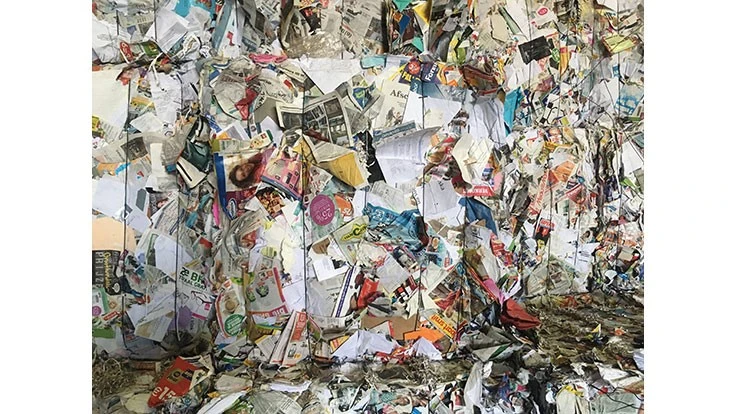
Several paper mills are expected to open new facilities or expand capacity for residential mixed paper by the end of 2019 into 2021.
Since China’s National Sword policy went into effect, Chaz Miller, chair of the Northeast Recycling Council (NERC)-Northeast Waste Management Officials' Association (NEWMOA) regional recycling markets committee, has been tracking North American paper mills that have announced capacity increases for recycled fiber in response to China's ban. Alongside Fibre Box Association CEO Dennis Colley, he's compiled a list of 18 mills that are increasing capacity to process paper themselves.
“I’ve been giving presentations on China and recycling for the past four decades,” says Miller, who has in the past worked with the U.S. Environmental Protection Agency (EPA), the glass packaging industry and the National Waste & Recycling Association (NWRA). “Shortly after China announced the ban, I started tracking mills that announced they'd use recycled fiber. Pratt Industries first announced its new plant opening in October, and then other facilities announced either new machines or new additions to what they were taking.”
Conyers, Georgia-based Pratt Industries' new Wapakoneta, Ohio, facility is expected to open in the fourth quarter of 2019. Hong Kong-based Nine Dragons Paper (Holdings) Ltd. also is converting existing machines and building new recycled pulp capacity at facilities in Biron, Wisconsin, Rumford, Maine, and Fairmont, West Virginia. Wisconsin-based Green Bay Packaging, Kingsey Falls, Quebec-based Cascades and Port Townsend, Washington-based Port Townsend Paper also are among the mills expanding capacity for old corrugated containers (OCC) and residential mixed paper.
The list “clearly points out a very natural result of this market turmoil," Miller says. “There’s a lot of raw material looking for a home."
He says what’s happening today in the market is no different from the market “collapse” in 1990, when municipal programs expanded from “under 1,000 to 5,000” in a few short years flooding the market as a result of recycling mandates.
“Markets always rebound," Miller says. "There’s a lot of entrepreneurs looking to use this as a raw material."
OCC is the primary recycled fiber for most of the new capacity; however, capacity for residential mixed paper is expanding “significantly.” At least six of the facilities are or have plans to process more residential mixed paper per year, which should drive up prices for mixed paper, Miller says.
Opening in 2021, Green Bay Packaging's new mill will have the capacity to process 685,000 tons of OCC and residential mixed paper per year. Also slated to open in 2021, Cascades' facility in Hanover, Virginia, will have the capacity to process 400,000 metric tons per year.
“The immediate impact has primarily been mills using OCC as a raw material are capable of using residential mixed paper,” Miller says. “They have the ability to do that in the way they do their pulping system.”
He adds, “It does create additional domestic markets, which is very important. We’re seeing bigger, new capacity, which will help stabilize the markets. It certainly increases the ability to use paper domestically. It’s our raw material instead of somebody else’s.”
Other mills, including Nine Dragons and Shanying, Ballard County, Kentucky, are building new capacity for recycled pulp to export to China. The list also includes Ecomelida, Orangeburg County, South Carolina, which processes food and beverage packaging and other paper mill pulp byproducts into plastic pellets.
“As the new mills and new machines open up, it will help stabilize prices and it creates a new domestic market,” Miller says. “Right now, the market is doing what markets always do. It’s responding to an opportunity, and the opportunity is recycled paper as an inexpensive raw material.”
Latest from Recycling Today
- Orion ramping up Rocky Mountain Steel rail line
- Proposed bill would provide ‘regulatory clarity’ for chemical recycling
- Alberta Ag-Plastic pilot program continues, expands with renewed funding
- ReMA urges open intra-North American scrap trade
- Axium awarded by regional organization
- Update: China to introduce steel export quotas
- Thyssenkrupp idles capacity in Europe
- Phoenix Technologies closes Ohio rPET facility





